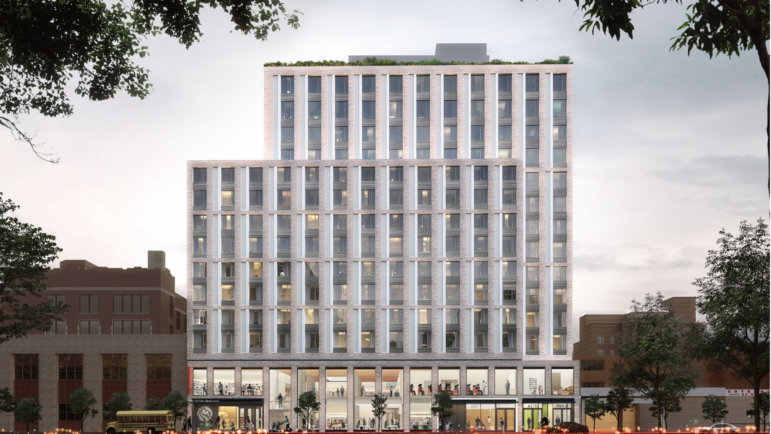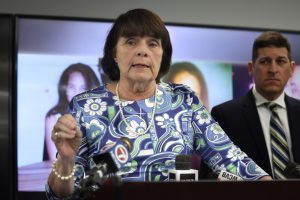
Opinion: A New Model for Affordable Housing
“There are many underdeveloped areas across Manhattan, which could provide tens of thousands more housing units, more than 40 percent of which could be affordable. Strategic planning and investment can transform underutilized spaces into a vibrant, inclusive community.”
Courtesy The Children’s Village
A rendering of the new building, The Eliza.
CityViews are readers’ opinions, not those of City Limits. Add your voice today!
It’s no secret that finding affordable housing in Manhattan is almost impossible. With rent averaging around $4,700 per month, according to a 2022 New York City Comptroller’s report, most families have been priced right out of the market. Addressing housing insecurity—and affordability—requires innovative solutions, and partnerships.
Last month, we cut the ribbon on one such landmark project in Inwood, which represents the way forward, bringing together public and private entities with shared goals, and combining affordable housing with resources for residents and community members alike.
The Eliza brings the concept of “live, work, play” often associated with luxury housing to the affordable housing space. It’s a 14-story building that contains 174 units, a mix of studio, one-, two-, and three-bedroom apartments available through the city’s affordable housing lottery to households with up to 60 percent of the area’s median income.
Approximately 10 percent of the units are set aside for New Yorkers earning up to 30 percent of the median income, and 20 percent of the units are reserved for tenants who were formerly homeless. Rents, set to start below $400 per month, vary by size of unit and income levels.
The mix of housing and onsite community resources is key to creating not just a living space but a community. Building residents will have access to a new library branch, an onsite gym, a tenant lounge, a children’s playroom, a community terrace, a roof garden, bike room, and laundry room. There also will be a teaching kitchen for workforce development, a state-of-the-art STEM center offering enrichment opportunities, an activities, culture, and training center, and a pre-K site led by the Department of Education.
Community nonprofits are leading this public-private partnership in tribute to Eliza Hamilton, the wife of Alexander Hamilton and an early supporter of the Inwood Public Library that this structure replaced. They include: The Children’s Village, Community League of the Heights (CLOTH), Ranger Properties, Alembic Community Development, Housing Workshop, as well as Robin Hood, the city’s largest poverty-fighting philanthropy organization. The New York City Department of Housing Prevention and Development, New York City Housing Development Corporation, and New York Public Library (NYPL) launched the development.
Developments like this are critical because New York’s affordable housing crisis has been getting worse. U.S. Census Bureau data shows that the median rent in Manhattan increased by about 50 percent from 2000 to 2019, far exceeding the rate of inflation. Nearly one-third of Manhattan renters are spending more than half of their income on rent, according to the Furman Center for Real Estate and Urban Policy.
The New York City Economic Development Corporation says the high cost of living in Manhattan also has wider implications for the city’s economy, impacting the labor market and consumer spending patterns.
The Eliza challenges the conventional wisdom that affordability and dignity are mutually exclusive and sets a new standard for future developments. A location with good schools and easy access to public transportation, community services, and affordability in an attractive building can help end segregation caused by substandard, densely populated living, inadequate schooling, and unsafe housing conditions, something too many New Yorkers endure.
The Eliza is just the first step in a broader vision for a more equitable Manhattan. We know that there are many underdeveloped areas across Manhattan, which could provide tens of thousands more housing units, more than 40 percent of which could be affordable. Strategic planning and investment can transform underutilized spaces into a vibrant, inclusive community—which combines affordable housing with neighborhood amenities.
Creating an inclusive city so everyone who wants to live here can find affordable housing is a monumental task calling for a diverse coalition of strong partnerships who will collaborate and find creative solutions. The fact that more than 70,000 applications were submitted for the 174 units at The Eliza tells us just how widespread this housing crisis is. The tremendous online response to videos of the Manhattan borough president’s recent apartment tour of The Eliza (800K+ views across TikTok and Instagram, with hundreds of application inquiries) underscores the urgent need for housing solutions like this.
While The Eliza’s lottery is now closed, it is clear we need more of these developments across New York City and around the state. As The Eliza now welcomes its new residents, let it stand as a sign of positive changes to come.
Mark Levine is the Manhattan Borough President. Dr. Jeremy C. Kohomban is the president and CEO at The Children’s Village. Yvonne Stennet is executive director at Community League of The Heights.
The post Opinion: A New Model for Affordable Housing appeared first on City Limits.


